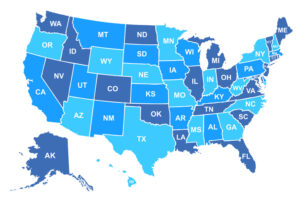Category: Health reform
How States Can Use Tax and Unemployment Filings to Sign People Up for Health Insurance

Easy-enrollment programs offer states an efficient, low-cost mechanism for connecting residents with comprehensive, affordable health care coverage. In a recent post for the Commonwealth Fund, CHIR experts Rachel Swindle, Rachel Schwab, and Justin Giovannelli review state efforts and effective strategies for improving easy enrollment programs and boosting healthcare enrollment.
States Increasingly Use Power Over Commercial Health Insurance to Boost Primary Care Investment

The U.S. significantly under-invests in primary care, even though the benefits of primary care access are well known. Several states are now using their health insurance rate review authority to push insurers to increase their investment. CHIR’s Maanasa Kona and Sabrina Corlette review these states’ strategies and their impact to date.
Raise the Bar: State-Based Marketplaces Using Quality Tools to Enhance Health Equity

In a new post for the Commonwealth Fund’s To The Point blog, CHIR’s Jalisa Clark and Christine H. Monahan describe how Washington and California’s quality programs are focusing on equity and highlight opportunities for other state-based marketplaces to similarly strengthen their own quality programs.
Improving Health Care Competition: Federal and State Perspectives

On Tuesday, May 21st, Georgetown University’s Center on Health Insurance Reforms held the final of three events in its series on the Futures of Employer-Sponsored Health Insurance. Event speakers Stacy Sanders, Erin Fuse Brown, David Seltz and Charles Miller discussed competition in health care from the federal and state perspectives.
Final Rule Rescinds Trump-Era Association Health Plans
Stakeholder Perspectives on CMS’s 2025 Notice of Benefit and Payment Parameters: Health Insurers and Brokers

The Biden administration will soon finalize its annual rulemaking for the Affordable Care Act Marketplaces. To better understand the impact of the proposed changes, CHIR reviewed the public comments submitted by key stakeholder groups. In this first in a 3-part blog series, CHIR expert Sabrina Corlette reviews the feedback provided by health insurance companies and web-brokers.
Looking Under the Hood: “Enhanced” Rate Review to Improve Affordability

A handful of states are working to improve health insurance affordability by boosting their insurance department’s rate review authority and empowering regulators to look “under the hood” at the prices commercial insurance companies negotiate for health care goods and services. In a recently released report, CHIR experts share findings from a 50-state assessment of rate review programs.
A Wolf in Sheep’s Clothing: The Pitfalls of Treating Telehealth Coverage as an “Excepted Benefit”

Congress is considering legislation that would make telehealth coverage an “excepted benefit.” CHIR experts discussed how the bill would impact consumers when it advanced in the House of Representatives in early 2023. In light of recent efforts to add the proposal to the government funding package, CHIRblog is republishing their post.
What States Are Doing to Keep People Covered as Medicaid Continuous Coverage Enrollment Unwinds

Several state-based Marketplaces have deployed innovative programs to keep people covered during the Medicaid unwinding. In their latest post for the Commonwealth Fund, CHIR’s Rachel Swindle and Sabrina Corlette assess the status of these programs and discuss the urgent need for more timely and accurate data on people transitioning from Medicaid to other forms of coverage.



